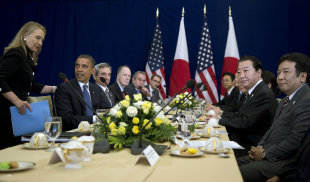 Secretary of State Hillary Rodham Clinton at a meeting with President Barack Obama, second from left, and Japan's …Secretary of State Hillary Rodham Clinton was supposed to be heading for the exit, even as the fight over who should succeed her escalated. Instead, America's top diplomat sped Tuesday to the Middle East on an urgent mission to douse flaring violence between Israel and Hamas, the Islamist Palestinian group that controls Gaza.
Secretary of State Hillary Rodham Clinton at a meeting with President Barack Obama, second from left, and Japan's …Secretary of State Hillary Rodham Clinton was supposed to be heading for the exit, even as the fight over who should succeed her escalated. Instead, America's top diplomat sped Tuesday to the Middle East on an urgent mission to douse flaring violence between Israel and Hamas, the Islamist Palestinian group that controls Gaza.
Amid early, disputed reports of a possible truce, Clinton had several major goals: Ease the violence, bolster Egyptian President Mohammed Morsi, and avoid an appearance of giving Hamas any sort of legitimacy on the world stage. The U.S. regards Hamas as a terrorist group and deals only with the Palestinian Authority of President Mahmoud Abbas, which controls the West Bank but has been relegated to the sidelines of the latest deadly clashes.
As Clinton winged her way to the troubled region, President Barack Obama—en route to Washington from a trip to Asia—spoke by telephone to Morsi from Air Force One, their third such conversation in 24 hours.
Obama "commended President Morsi's efforts to pursue a de-escalation," Deputy National Security Adviser Ben Rhodes told reporters aboard the presidential plane. "And he also underscored that President Morsi's efforts reinforce the important role that President Morsi and Egypt play on behalf of regional security and the pursuit of broader peace between the Palestinians and Israelis."
Morsi, whose country shares a peace accord with Israel and a border with Gaza, is thought to have sway with Hamas.
Clinton was to stop in Jerusalem for talks with Israeli Prime Minister Benjamin Netanyahu, in Ramallah to meet with Abbas and in Cairo for discussions with Morsi. State Department spokeswoman Victoria Nuland said Clinton aimed for a "de-escalation of violence and a durable outcome that ends the rocket attacks on Israeli cities and towns and restores a broader calm."
American officials have been leery of using the term "cease-fire," preferring variations on "de-escalation" of the conflict.
Clinton's visit came as the political battle over the Sept. 11 terrorist attack on the American compound in Benghazi, Libya, clouded the debate over who will succeed her.
Republicans have accused the Obama administration of covering up the role of suspected extremists in the assault, and questioned whether Clinton's State Department correctly handled requests for more security at the site. The president's foes have targeted Susan Rice, the U.S. ambassador to the United Nations, who at the request of the White House in several television interviews incorrectly tied the attack to protests sparked by an Internet video that ridiculed Islam.
The Benghazi strike claimed the lives of Ambassador Chris Stevens and three other Americans. It has also highlighted the uncertain fate of so-called Arab spring countries—like Egypt—where popular movements swept aside decades-old authoritarian regimes.
Ahead of Clinton's visit, the White House renewed its support for Israel's military operations but hinted at disapproval of a possible ground offensive. Netanyahu's government has called up thousands of troops in what could be preparations for such an onslaught.
Rhodes told reporters the U.S. would prefer to see the Israelis work "diplomatically and peacefully" to resolve the crisis, noting both Palestinian and Israeli civilians would be at risk in the event of a ground assault.
Clinton's stop in Ramallah underscored a diplomatic peculiarity of her trip: Top U.S. officials regard the Palestinian Authority as such minor players in the current crisis, neither Obama nor Clinton have spoken to Abbas since the violence escalated nearly a week ago.
While Clinton by Monday had reached out to leaders—including Jordan's King Abdullah; the foreign ministers of Israel, Egypt, France and Turkey; Egypt's prime minister; and U.N. Secretary-General Ban Ki-moon—she had not spoken to Abbas.
By refusing to deal directly with Hamas and reaching out to the Palestinian Authority instead, Clinton appeared to be trying to resolve the conflict without involving one of the key participants.
Rhodes on Tuesday reiterated U.S. conditions for dealing directly with Hamas: The group must renounce terrorism and recognize Israel's right to exist.
He also defended Clinton's trip to Ramallah, calling it a worthwhile investment "both as it relates to what's happening in Gaza and our efforts going forward to improve the situation in Gaza, but also in terms of our broader efforts to pursue peace between the Israelis and Palestinians."
Rhodes's message was implicit but unmistakable: If the Palestinians want a lasting peace deal, they should align with the Palestinian Authority and not with Hamas or other extremist groups.
The U.S. has for years been steadfast in its posture toward Hamas. Massachusetts Sen. John Kerry, a top contender for Clinton's job, did not talk to Hamas when he made a surprise visit to Gaza in January 2009.
Clinton headed to the Middle East after traveling to Asia with Obama on what aides to both expected would be their final joint trip overseas, including a history-making stop in Myanmar.
Aboard Air Force One on a flight between Rangoon and Cambodia, the one-time political rivals sat in Obama's private office sharing memories of their work together.
"As the president said, it wasn't just the last four years; they have been through a lot together over the last five or six years," Rhodes said. "But right now there is urgent business to be done."











